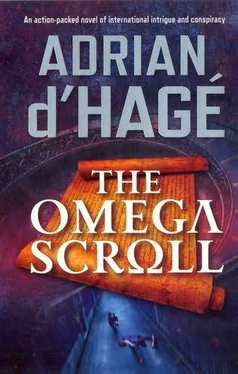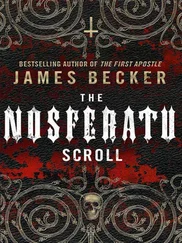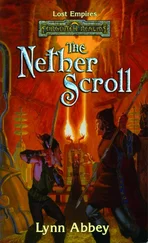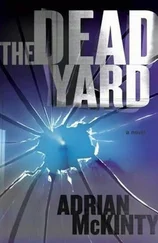Adrian D'Hage - The Omega scroll
Здесь есть возможность читать онлайн «Adrian D'Hage - The Omega scroll» весь текст электронной книги совершенно бесплатно (целиком полную версию без сокращений). В некоторых случаях можно слушать аудио, скачать через торрент в формате fb2 и присутствует краткое содержание. Жанр: Политический детектив, на английском языке. Описание произведения, (предисловие) а так же отзывы посетителей доступны на портале библиотеки ЛибКат.
- Название:The Omega scroll
- Автор:
- Жанр:
- Год:неизвестен
- ISBN:нет данных
- Рейтинг книги:3 / 5. Голосов: 1
-
Избранное:Добавить в избранное
- Отзывы:
-
Ваша оценка:
- 60
- 1
- 2
- 3
- 4
- 5
The Omega scroll: краткое содержание, описание и аннотация
Предлагаем к чтению аннотацию, описание, краткое содержание или предисловие (зависит от того, что написал сам автор книги «The Omega scroll»). Если вы не нашли необходимую информацию о книге — напишите в комментариях, мы постараемся отыскать её.
The Omega scroll — читать онлайн бесплатно полную книгу (весь текст) целиком
Ниже представлен текст книги, разбитый по страницам. Система сохранения места последней прочитанной страницы, позволяет с удобством читать онлайн бесплатно книгу «The Omega scroll», без необходимости каждый раз заново искать на чём Вы остановились. Поставьте закладку, и сможете в любой момент перейти на страницу, на которой закончили чтение.
Интервал:
Закладка:
‘Where would they go?’ asked the Minister for Agriculture.
‘Who cares,’ the Defense Minister shot back. ‘Jordan. Lebanon. Baluchistan. As long as they’re out of Israel.’
‘The Palestinian people are a reality and our policy should reflect that.’ The Foreign Minister’s voice was quiet but insistent. ‘If we push them over our borders and take over their land it will turn international opinion against us and I predict the rest of the Arab world will be more inclined to provide support and bases for terrorist operations. I would urge a more restrained approach.’
‘I am being restrained!’ the Defense Minister exploded. His nostrils flared and he spat the words across the table. ‘The Arabs are a creeping black cancer that needs to be excised!’
The Prime Minister was used to outbursts from his Defense Minister and without responding he turned to his media adviser and asked, ‘What are the public opinion polls saying?’
‘Three to one in favour of direct action against the Palestinians, Prime Minister.’
The Defense Minister sniffed again and leaned back in his chair with a self-satisfied look on his face.
Silence settled over the Cabinet table until finally the Prime Minister broke it.
‘I think there are arguments on both sides,’ Gebin said, trying to keep the fractious Cabinet together. ‘If we move against the village of Deir Azun it is clear there are dangers, especially if there are heavy casualties. It is equally clear that we can’t just sit back and allow these attacks to continue.’ He turned to Yossi. ‘You say there are three houses that are possibly suspect in this village?’
‘Yes, Prime Minister, but they are only suspect. Our source is unreliable.’
‘It seems to me that if these houses are suspect they should be destroyed. And if that is not enough the whole village should be destroyed,’ said the Minister for Defense.
‘Taking that into account…’ Again the Prime Minister refrained from responding to the roaring walrus opposite him and this time he looked to the Israeli Defense Force Chief of Staff, Lieutenant General Halevy, a smaller version of the Defense Minister. ‘I propose an operation of limited scope,’ the Prime Minister ordered. ‘The village is to be surrounded and occupied, but not permanently. The occupants of the houses that are suspect are to be brought in for questioning and the soldiers are to be instructed to use minimum force.’ He turned to his media adviser again. ‘And those directions should be spelled out to the international media, but only after the operation has commenced.’ Prime Minister Chenamem Gebin surveyed the faces at the table. No one spoke. ‘If there is nothing further we will meet at the same time tomorrow.’
Yossi felt distinctly uneasy. As the Prime Minister issued his orders of restraint, the unmistakable gleam of hatred in the Defense Minister’s eyes intensified.
Deir Azun
The earth in the Samarian hills of the West Bank was red and parched. As the sun began to set behind the mountains that cradled the little Palestinian village of Deir Azun, Yusef Sartawi scooped up the last of the bitter black olives from the nets spread at the bottom of the gnarled and twisted tree he’d been working on. Rivulets of sweat ran down his bare chest and back, soaking the top of his faded baggy shorts. He stretched to his full height of 186 centimetres and pulled his shoulders back, pressing against the dull ache in his muscles and momentarily resting his forehead against the rough wood of the ancient tree. As four generations of his family before him had done, and as the Greeks and Romans had done centuries before that, Yusef shouldered his battered wicker basket of fruit. His cracked leather boots kicked up puffs of red dust as he marched purposefully down the side of his father’s hill between the rows of trees.
‘Muhammad!’
Three rows over Yusef’s ten-year-old brother sat up, startled. Guilt was plastered all over his young face.
‘They won’t pick themselves, you know.’
Muhammad got to his feet sheepishly.
‘I was just having a minute’s rest,’ he said, doing his best to sound indignant.
‘I suppose that’s why you were asleep,’ Yusef retorted, but he said it without malice. At twenty-one Yusef was the second of five children and as a Palestinian he was one of the lucky ones. His parents had worked long and hard to ensure that all their children would receive an education, and now Yusef was enrolled at college in Nazareth, training to become a sound engineer. During semester breaks he came home to help with the harvest. Yusef and his younger brother Muhammad were separated by two sisters, Liana, who had just turned fifteen, and seventeen-year-old Raya. Their eldest brother, Ahmed, was studying to become a cleric and was in his last year at Al-Quds University in Ramallah. Today Ahmed was coming home on two days’ leave to celebrate Liana’s birthday. It would be good to see him, Yusef thought. And to have the family together again.
As he approached the old wooden pressing shed Yusef could hear the unmistakable rumble of the big granite wheel, the Hajar al-Bad. The family donkey was plodding a well-worn circular path, laboriously grinding the fruit into a paste, the leather straps and wooden harness creaking in protest at the weight of the wheel. Yusef’s father, Abdullah Sartawi, was hard at work bearing down on the paste in the old lever press. He was not as tall as his sons, but he was lean and fit, his shoulders broad and muscled from years of working in the groves. His dark, closely cropped hair was peppered with grey and the years of Palestinian sun could be seen in his face. Abdullah Sartawi was a man of strong ethics and had passed on his rock-solid faith in Allah and Islam to his family which, despite the Israeli occupation of Palestinian land and the constant threat of war and uprising, gave the Sartawi family a sense of purpose, dignity and hope.
The first-pressing virgin olive oil was trickling into the vat where it would settle. Yusef sniffed at it appreciatively. Sartawi oil was among the finest in Palestine and the subtle aroma had seeped into every crevice of the shed.
‘It is a good crop this year, eh Yusef?’
‘The best, Father, the best.’
‘I will tell your mother tonight, this year I think we might be able to afford a water pump for the house.’
‘She would like that, Father.’ Ever since Yusef could remember, water for the household had to be hauled in buckets. The mudbrick house with its dirt floors was at the end of one of the red dusty tracks that led from the village square. Every day his mother Rafiqa or, now that they were old enough, one of his sisters would trudge down the hill and queue at the rusting, squeaky water pump.
Up at the house in the old kitchen preparations for Liana’s birthday were well under way at the rough wooden bench.
‘Tonight we have an appetiser,’ Rafiqa announced, delegating the slicing of the sweet green peppers to Raya and the tomatoes to Liana. ‘ Shakshoukeh.’ A dish of sweet green peppers and tomatoes fried in olive oil with thick slices of garlic, pepper and salt.
Despite the years of village life and five children, there was a certain elegance about Rafiqa. She was slightly built, with burnished olive skin, an oval face and dark hair parted severely. Over the years her serenity had calmed the energy of a house full of children. Raya was like her father. With his heavy eyebrows, she was quiet and reflective. Liana, as much as she was allowed to be, was energetic and rebellious.
‘Your father has brought in a chicken.’
Liana’s dark eyes danced. ‘Chicken fatteh! ’
‘Just for you, my child, with your favourite seasoning – cardamom and nutmeg.’ Rafiqa stoked the cantankerous old wooden stove with an expertise born of long years of practice. Water for the rice simmered in a well-used blackened pot.
Читать дальшеИнтервал:
Закладка:
Похожие книги на «The Omega scroll»
Представляем Вашему вниманию похожие книги на «The Omega scroll» списком для выбора. Мы отобрали схожую по названию и смыслу литературу в надежде предоставить читателям больше вариантов отыскать новые, интересные, ещё непрочитанные произведения.
Обсуждение, отзывы о книге «The Omega scroll» и просто собственные мнения читателей. Оставьте ваши комментарии, напишите, что Вы думаете о произведении, его смысле или главных героях. Укажите что конкретно понравилось, а что нет, и почему Вы так считаете.











